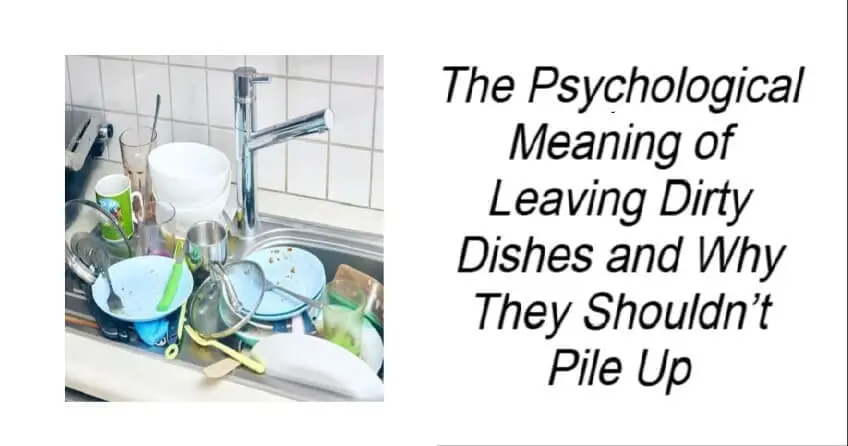
The Psychological Meaning of Leaving Dirty Dishes

The condition of our home often mirrors the condition of our inner world. And few household details are as revealing as the dishes in your sink.
Though washing dishes may seem like a small, mundane chore, it can actually offer powerful insight into our emotional well-being, mental patterns, and daily habits. But why do some people consistently avoid doing the dishes—and what might it say about their psychological state?
The Psychology Behind Dirty Dishes
1. Stress and Exhaustion
For many people, unwashed dishes aren't a sign of laziness—they’re a sign of burnout. After a long day of working, caregiving, studying, or making countless decisions, the idea of doing even one more thing—like scrubbing a pan—can feel like too much. This type of decision fatigue can erode motivation and energy, leaving tasks undone not out of choice, but sheer depletion.
2. Procrastination and Disorganization
Letting dishes pile up may reflect a broader tendency to procrastinate, especially with tasks that feel repetitive or thankless. When our environment lacks structure, or when we feel overwhelmed by other obligations, we tend to put off low-reward tasks. Unfortunately, this can create a cycle of avoidance and clutter that becomes harder to break over time.
3. Mental Health Challenges
A growing pile of dirty dishes can be a subtle, but significant, indicator of emotional distress. Individuals experiencing depression, anxiety, or trauma may find it difficult to keep up with daily routines. Even small tasks can feel like insurmountable obstacles. In these cases, the dishes aren’t the problem—they’re a symptom of something deeper.
4. Lack of Routine and Structure
When life lacks routine, daily responsibilities can easily fall through the cracks. A consistent rhythm helps maintain order not just in your home, but also in your mind. Without it, the small tasks—like cleaning up after a meal—often get delayed or forgotten altogether, contributing to feelings of disarray.
5. Overwhelm and Decision Paralysis
Sometimes, a dirty sink is the result of simply not knowing where to start. When your environment feels chaotic, choosing which task to tackle first can feel paralyzing. In these moments, dishes become just one more item on an already daunting to-do list.
Why Letting the Dishes Pile Up Becomes a Bigger Issue
Even if it seems harmless at first, letting dishes go for too long can have real consequences—not just for your kitchen, but for your overall well-being.
1. Health and Hygiene Risks
Food residue attracts pests like ants, cockroaches, and fruit flies. More importantly, it becomes a breeding ground for bacteria and mold. A neglected sink can quickly turn into an unsanitary environment, contributing to unpleasant odors and even health issues over time.
2. Visual Clutter = Mental Clutter
Our brains are sensitive to visual stimuli. Cluttered, messy spaces increase feelings of stress and restlessness. The sight of a full sink, even if you try to ignore it, can generate background anxiety, guilt, or even a sense of failure. This is especially true if you’re spending more time at home.
3. Discipline and Self-Respect
Taking time to clean up after yourself sends a message to your subconscious: I matter, and my space matters too. It’s a small but powerful act of self-respect. Over time, these small actions build discipline, which strengthens your emotional resilience and sense of control.
4. Healthier Relationships at Home
In shared living situations, dishes are a frequent flashpoint. When one person avoids the task, resentment often builds. On the other hand, taking responsibility for shared spaces—without needing to be asked—fosters mutual respect and smoother cohabitation.
5. Momentum for Other Habits
Tackling one simple task, like washing dishes, can create a ripple effect. When we take care of small things, we feel more motivated to take care of bigger ones. It’s not just about clean plates—it’s about building momentum toward a healthier, more organized life.
More Than Just a Chore: A Reflection of You
At its core, washing dishes is about more than cleanliness. It’s a ritual of care—both for your space and for yourself. It can represent discipline, emotional clarity, and even self-worth. Conversely, neglecting such tasks doesn’t make you a bad person, but it may be worth asking: Is something deeper going on?
Letting a few dishes sit overnight isn’t a cause for concern. We all have those days. But if ignoring the dishes becomes a pattern, it could be a gentle cue from your environment that your mental or emotional state needs attention.
In the end, the state of your sink is more than a household detail—it’s a window into your mind. And sometimes, the simple act of washing a dish can be the first step toward restoring a sense of order, peace, and well-being in your life.
News in the same category


7 warning signs of kidney failure in your feet – #5 is easy to miss!

Shoulder Pain from Sleeping: Causes, Solutions and More

Teacher Shocked by Stage 4 Stomach Cancer Diagnosis After Mistaking Sore Throat for a Common Cold – 2 Kitchen "Culprits" Exposed
A sore throat may seem like nothing more than a seasonal annoyance, but sometimes it hides something far more dangerous. That was the devastating reality for a retired teacher in Taiwan who thought his discomfort was due to cold weather—until doctors re

50-Year-Old Man Dies After Eating Leftovers: 5 Foods You Should Never Keep Overnight
Leftovers may seem harmless, but in some cases, they can turn into hidden health risks. A tragic case has recently drawn attention to how certain foods, when stored improperly or left too long, may lead to life-threatening consequences.

3 Morning Urine Signs That Could Signal Silent Kidney Trouble – Don’t Ignore Them
Protecting your kidneys is about more than preserving the urinary system—it is about safeguarding your energy, your heart, and your long-term health.

Top 10 foods that improve blo:od circulation in legs

Cardiologist Reveals the #1 Exercise to Prevent a Heart Attack

Doctors prescribe LEVOTHYROXINE—but here’s what they don’t tell you

Claim: a juice regimen reportedly cleared can:cer cells in 42 days

Woman Endures Years of Swollen Foot Before Doctor Reveals Shocking Cause

Things People Do That Put Themselves Closer to a Stroke

The Harmful Effects of Squatting Over a Toilet 🚽

Rare Body Features That Show Just How Incredible the Human Body Is

Proven Health Benefits of Dates

Man Suffers a Stroke from Bathing After a Meal: 3 Things You Should Never Do

5 Warning Signs of a Dangerous Stroke and the 4 Groups Most at Risk

Waking Up at Midnight: Husband Complains of a Headache, Wife's Quick Thinking Saves His Life

Doctors finally reveal the BENEFIT of one egg a day
News Post

I Prepared a Cake for My Daughter’s Party, but Something Went Wrong

My Grandson’s Remark About His Stepmom Seemed Small, but It Led Me to a Bigger Discovery

The Power of an Unexpected Apology.

Put onion slices on the soles of your feet, great benefits, both men and women need

The Firefighter and the Mountain Lion.

Soak the stem with this water. When cooked, it will still be crispy and delicious, and will not cause itching

🧄🧅 Garlic and Onion: The Natural Secret to Better Hearing

Why Its So Important Not To Flush The Toilet After Every Trip

The Boy Who Brought Water to Half a Million Souls.

Say Goodbye to Blocked Arteries with These Powerful Foods (Better Than Aspirin!)

What Is the Longest River in the World? Top 5 Longest Rivers

The Monster Waves at Nazare, Portugal

Do Stoned Dolphins Give ‘Puff Puff Pass’ A Whole New Meaning?

Recently Discovered Dinosaur ‘Mummy’ Is So Well-Preserved It Even Has The Skin And Guts Intact

Travel Coast-to-Coast by Train and See America’s Greatest Sites For Just Over $200

Sleepy Polar Bear Portrait Wins the Wildlife Photographer of the Year People’s Choice Award

Oil Infusion For Fast Hair Growth

Most Widely Used High Blood Pressure Drug May Harm Heart Health, Study Shows
